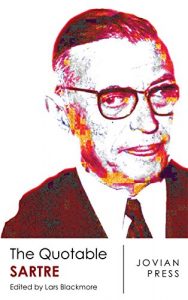Jean Paul Sartre was easily one of the most powerful and thought-provoking philosopher/writers to have ever lived.
Sartre’s primary philosophical idea is that people, as humans, are “condemned to be free”. This theory relies upon his position that there is no creator, and is illustrated using the example of the paper cutter. Sartre says that if one considered a paper cutter, one would assume that the creator would have had a plan for it: an essence. Sartre said that human beings have no essence before their existence because there is no Creator. Thus: “existence precedes essence”. This forms the basis for his assertion that since one cannot explain one’s own actions and behavior by referencing any specific human nature, they are necessarily fully responsible for those actions. “We are left alone, without excuse.” “We can act without being determined by our past which is always separated from us.”
Sartre maintained that the concepts of authenticity and individuality have to be earned but not learned. We need to experience “death consciousness” so as to wake up ourselves as to what is really important; the authentic in our lives which is life experience, not knowledge. Death draws the final point when we as beings cease to live for ourselves and permanently become objects that exist only for the outside world. In this way death emphasizes the burden of our free, individual existence.
While Sartre’s philosophy is less accessible to the lay reader than his literary works, we highly encourage anyone who finds the following quotes deliciously satisfying to consume all of his works in their entirety. His literary prowess earned him a Nobel Prize, and the notoriety which his award earned him was warranted, as you’ll discover in the following pages.
Sartre’s primary philosophical idea is that people, as humans, are “condemned to be free”. This theory relies upon his position that there is no creator, and is illustrated using the example of the paper cutter. Sartre says that if one considered a paper cutter, one would assume that the creator would have had a plan for it: an essence. Sartre said that human beings have no essence before their existence because there is no Creator. Thus: “existence precedes essence”. This forms the basis for his assertion that since one cannot explain one’s own actions and behavior by referencing any specific human nature, they are necessarily fully responsible for those actions. “We are left alone, without excuse.” “We can act without being determined by our past which is always separated from us.”
Sartre maintained that the concepts of authenticity and individuality have to be earned but not learned. We need to experience “death consciousness” so as to wake up ourselves as to what is really important; the authentic in our lives which is life experience, not knowledge. Death draws the final point when we as beings cease to live for ourselves and permanently become objects that exist only for the outside world. In this way death emphasizes the burden of our free, individual existence.
While Sartre’s philosophy is less accessible to the lay reader than his literary works, we highly encourage anyone who finds the following quotes deliciously satisfying to consume all of his works in their entirety. His literary prowess earned him a Nobel Prize, and the notoriety which his award earned him was warranted, as you’ll discover in the following pages.






